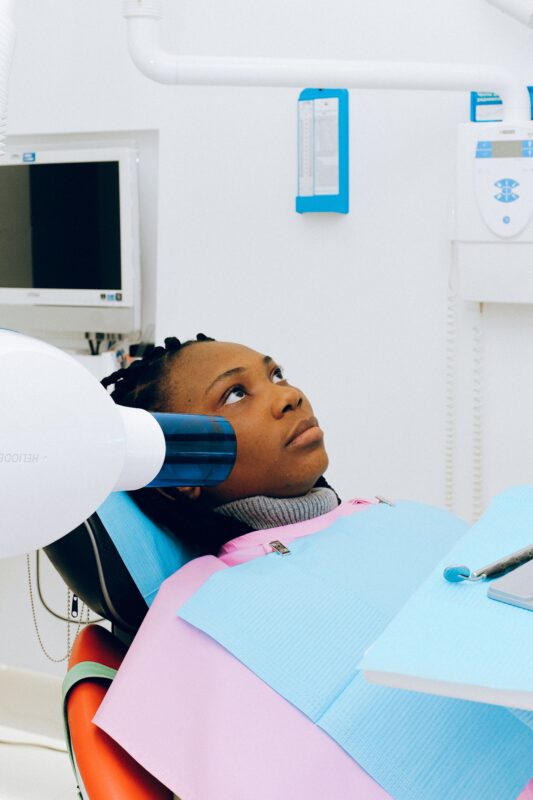Geographic tongue is not called a wandering rash for nothing.
Before you find out the reason, read Kosi’s story.
GEOGRAPHIC TONGUE
Kosi’s story…
Kosi had been talking for ten minutes, and as she spoke, she decided that she felt better. They say, ‘a problem shared is one that is half-solved’ and she hoped to find some help. As she talked her heart out, there was concern written all over her face, her voice was full of emotion and her shoulders were heavy with worry.
It was the 30th day since the announcement of the first confirmed case of the COVID-19 pandemic in Nigeria and Kosi had become concerned about many things. She was worried about the health of her loved ones and she was worried about the rising prices of everything.
She was also worried about her business and it had become obvious to her that things were changing, everything from the economics of the world to consumer behaviour. Confused, she had decided to share her worries with her elder brother who is a dentist.
Her brother had also been affected by the pandemic as he could not go to work as usual.

AND THE GEOGRAPHIC TONGUE WAS DISCOVERED…
As she spoke, she realised that he stared at her mouth intently.
Wondering what it was, she finally paused
Kosi- “Dede, what’s wrong? You have been staring at my mouth for a while”
Dede– “Kosi, please stick out your tongue. Let me have a look”
A little puzzled, she obeyed and stuck out her tongue. As soon as she did, Dede knew what it was.
Kosi- “Dede, what did you find?”
He smiled and said, “Does your tongue hurt?”
Kosi- “Yes, actually” She said as she went straight for the sitting room mirror and Dede followed closely behind. She did not need to look too hard, she saw it too. She could see the irregular shape on her tongue, and the red patches.
Her heart skipped a beat as she turned to her brother, “Dede, what does this mean?”
Dede– “Kosi, let’s sit” He said, smiling again
Her heart was already racing,
Kosi- “I hope it isn’t serious because it doesn’t look pretty”
Dede– “You said it hurts?”
Kosi- “Yes, somewhat. It’s just this mild discomfort, or burning sensation. And it gets worse when I eat spicy food. I started to notice it a few days ago”
“I see. And perhaps the scare of this pandemic is causing you some stress” He replied
Again, her shoulders drooped.
Kosi- “I am absolutely stressed out. You know it Dede”
He responded, “You’ll be fine”
Kosi stood up again to walk to the mirror, and said “First of all, Dede, this thing on my tongue looks scary”
Dede– “It’s not that bad”
Kosi- “I don’t like how it looks, I feel so embarrassed to speak already. So everyone will stare at me when I speak?”
Dede– “It most likely wouldn’t be there all the time plus trust me, it’s not as bad as you think. Come, sit down”
Dede began to tell her about the condition known as Geographic Tongue.
It was at that moment, for the first time, that it felt good they were both home and out of work; at least she was getting help for her worries.
WHAT’S GEOGRAPHIC TONGUE?
Geographic tongue is a harmless condition that is fairly common and manifests as inflammatory patches on the tongue that resemble a map. The condition is characterized by smooth-surfaced, red, irregular patches on the tongue which are surrounded by sharply defined white borders.
Your dentist may also diagnose it as “Benign migratory glossitis” because the patches appear to move from one part of the tongue to another. The lesions may completely disappear from one part of the tongue and reappear after some time on a different part of the tongue.
As a result of the alarming appearance, this condition might cause an embarrassment or anxiety for affected individuals. While the lesions last, it might be uncomfortable to speak in public for fear of attracting unwanted attention.
In affected individuals, the condition may also cause fear of something sinister.
HERE ARE SOME THINGS TO KNOW ABOUT GEOGRAPHIC TONGUE
No one is quite sure what causes geographic tongue but the condition has been associated with some risk factors and conditions.
In some affected people, it may be developmental or may be associated with a family history. If there is a family history, an affected individual may have inherited it from his or her parents.

People who have these conditions may be more likely to get geographic tongue than other people
- Psoriasis
- Reiter’s syndrome
- Fissured tongue
- Lichen planus
These factors have only been proposed as possible causes as they have been found in affected individuals. It has not been concluded that they cause geographic tongue.
- Emotional stress
- Psychological conditions
- Hormonal imbalances : These include surges in female hormone levels in people who use contraceptive pills
- Allergies
- Diabetes Mellitus, especially type 1 Diabetes Mellitus
- Vitamin deficiencies, especially Vitamin B
- Pregnancy
The symptoms of geographic tongue include:
- Smooth irregular red patches on the sides and the top of the tongue, these patches are surrounded by white borders. The patches may have different sizes, shapes and colours.
- The patches may be present in other areas apart from the tongue
- The patches do not have the tiny bumps (papillae) that usually cover the surface of the tongue
- Mild pain or discomfort. Sometimes, it may feel like a burning sensation.
TIPS FOR YOUR VISIT TO THE DENTIST
If you think you may have geographic tongue and you would like to pay a visit to the dentist, here is what you can expect:
- The dentist will introduce himself or herself to you. He or she will also carry you along from start to finish.
- He or she will take your history. You will be asked if you have experienced any of the described symptoms and if there has been a history of the above mentioned risk factors or associated conditions.
- To make sure there are no other problems, he or she will examine your face, the glands under your lower jaw as well as your temporomandibular joint. He or she will also check to see if you have a fever.
- He/she will examine your tongue and the rest of your mouth for anything abnormal or unhealthy.
- He/she will examine your teeth for holes because tooth decay always need to be taken care of.
- He/she will examine your oral hygiene. If your oral hygiene is not very good or if you have not done a routine scaling and polishing procedure to clean your teeth, you may have to do so.
- If your dentist is convinced it is geographic tongue, he or she will go on to administer treatment or give you some recommendations.
- If He/she is not convinced, you may be asked to run some tests.
Geographic tongue does not have a cure and may not require any treatment at all. Without treatment, the lesion and symptoms will likely disappear in a few days or weeks. Some people never notice they have the condition and never get treated.
Your dentist may prescribe some medications to ease any associated pain or discomfort. He or she will also make some recommendations to help you cope with the lesions while they last.
These include:
- Over-the-counter pain medications.
- Mouth rinses: Corticosteroid mouth rinses to help reduce the inflammation.
The mouth rinses may contain a mild anaesthetic or anti-histamine agent.
- Topical anaesthetics can be used to numb the pain by applying them right on the surface of the tongue.
- Vitamin B supplement
- Zinc supplement
RECOMMENDATIONS
The dentist may make the following recommendations:
- Avoid foods that irritate the lesions and cause discomfort or pain.
These foods include hot foods, spicy foods, salty foods, sweet foods, acidic foods.
- Avoid pain triggers such as cigarette smoking, tobacco chewing, tooth whitening agents, highly flavoured toothpastes and mouthwashes.
- Maintain good oral hygiene.
Brush twice a day with a fluoridated toothpaste and a medium-bristle toothbrush (for people aged 8 years and older, a soft bristle toothbrush is appropriate before age 8).
The pain medications would take care of the pain, so you would not have to worry about pain while cleaning your mouth.
- Relax!
While the patches may look worrisome, there is no reason to be worried about a Geographic tongue diagnosis. The condition is harmless.
FAQ
Anyone can. It can occur at any time in life, it can happen during childhood or adulthood. However, it has been found to occur more in females than males.
No, the condition is harmless
No, the condition cannot be transferred from an affected person to another person.

